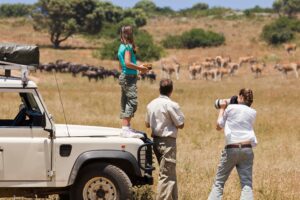How Ethical Wildlife Tourism Promotes Conservation and Sustainable Adventures


Wildlife tourism offers travelers the unique opportunity to witness animals in their natural habitats, fostering a deeper appreciation for the natural world. However, it is a double-edged sword. It can disrupt ecosystems and harm the species it seeks to showcase when done irresponsibly. On the other hand, ethical wildlife tourism minimizes harm and plays a pivotal role in conservation efforts and sustainable travel practices. By prioritizing respect for wildlife and the environment, ethical tourism ensures that future generations can continue to enjoy and protect the wonders of the natural world.
Understanding Ethical Wildlife Tourism
Ethical wildlife tourism involves activities that allow people to experience and appreciate wildlife without causing harm or exploitation. It strongly emphasizes maintaining the welfare of animals, protecting their habitats, and supporting local communities. Unlike exploitative practices, such as unregulated safaris or animal shows, ethical wildlife tourism operates within a framework of sustainability and conservation.
A key feature of this approach is education. Ethical tourism encourages travelers to learn about the species they encounter, their behaviors, and their threats. This awareness fosters a connection between visitors and wildlife, inspiring a commitment to conservation.
The Connection Between Tourism and Conservation
Ethical wildlife tourism is a powerful tool for conservation. By creating economic incentives for the protection of natural habitats, it helps combat destructive practices such as deforestation and poaching. Tourism revenue often funds conservation projects, wildlife monitoring, and anti-poaching patrols.
For example, national parks and wildlife reserves often rely on tourist entry fees and donations to maintain operations. These funds manage ecosystems, support endangered species breeding programs, and research wildlife populations. Ethical tourism ensures that the money generated benefits conservation directly, creating a cycle where protecting wildlife supports local economies.
Community Involvement in Sustainable Travel
One of the hallmarks of ethical wildlife tourism is its focus on empowering local communities. These communities often serve as custodians of the ecosystems surrounding them, and their well-being is closely tied to the environment’s health. By involving residents in tourism initiatives, ethical practices create opportunities for sustainable livelihoods.
For instance, community-led tours or eco-lodges often employ local guides, chefs, and staff, ensuring revenue flows back into the community. This approach reduces economic dependence on harmful activities, such as logging or mining, and fosters a sense of ownership and responsibility for conservation efforts. When local communities benefit directly from wildlife tourism, they become allies in protecting the environment and its inhabitants.
Avoiding Exploitative Practices
Not all wildlife tourism is ethical. Activities like riding elephants, posing for pictures with drugged tigers, or participating in dolphin shows often cause immense suffering to animals. These practices may seem harmless on the surface, but they are rooted in exploitation and cruelty.
Ethical tourism rejects such practices, focusing instead on observing animals in their natural habitats. For instance, a safari that respects safe distances from animals or a whale-watching tour led by experienced naturalists ensures that wildlife remains undisturbed. Travelers play a crucial role in this dynamic by choosing operators and experiences prioritizing animal welfare over profit.
Protecting Fragile Ecosystems
Wildlife tourism often occurs in fragile ecosystems, where even small disturbances can have lasting effects. Ethical tourism recognizes this vulnerability and seeks to minimize its impact. This involves adhering to strict guidelines, such as limiting visitor numbers, avoiding off-road driving, and prohibiting littering.
Additionally, ethical operators work to educate tourists about their environmental footprint. Travelers are encouraged to use eco-friendly products, reduce waste, and respect wildlife by keeping a safe distance. These measures ensure that ecosystems remain intact and continue to support biodiversity.
Inspiring a New Generation of Conservationists
One of the most powerful outcomes of ethical wildlife tourism is its ability to inspire change. Witnessing the beauty of nature firsthand often sparks a sense of responsibility in travelers. Many leave these experiences with a renewed commitment to protecting wildlife, whether by donating to conservation efforts, volunteering, or advocating for sustainable travel practices.
Furthermore, ethical tourism often collaborates with schools and educational institutions to spread awareness about conservation. Teaching younger generations about the importance of protecting wildlife lays the groundwork for a future where sustainability is a priority.
The Role of Travelers in Promoting Ethical Tourism
Travelers hold significant power in shaping the tourism industry. They can support ethical operators and discourage exploitative practices by making informed choices. Researching tour companies, asking questions about animal welfare policies, and seeking certifications from reputable organizations are essential steps.
Moreover, travelers should be mindful of their behavior during wildlife encounters. Simple actions, like maintaining silence around animals, respecting local customs, and refraining from feeding wildlife, can make a big difference in ensuring ethical interactions.
A Shared Responsibility for a Sustainable Future
Ethical wildlife tourism is a shared responsibility. Tour operators, governments, local communities, and travelers all play a role in ensuring that tourism benefits wildlife rather than harming it. Governments must establish and enforce regulations protecting wildlife, while tour operators should adopt transparent practices prioritizing conservation.
Local communities must be empowered to lead tourism initiatives, ensuring their knowledge and traditions are respected. Travelers, meanwhile, must approach wildlife tourism with curiosity, humility, and a commitment to leaving no trace behind.
Traveling With Purpose
Ethical wildlife tourism is more than a travel trend—it is a call to action. By embracing sustainable practices and supporting conservation, travelers can transform their adventures into meaningful contributions to the planet.
The natural world is a precious gift, and ethical tourism ensures it remains vibrant and thriving for future generations. As more people choose to travel responsibly, the ripple effects of these decisions will safeguard wildlife, protect ecosystems, and promote a future where humans and nature coexist in harmony. Ultimately, ethical wildlife tourism is not just about observing the wild but about preserving it.
